Poesía de la India: Mamta Sagar
1 abril, 2010
En una de las antiguas disciplinas del budismo, en la India, se creía que el sonido de cada sílaba de una palabra correspondía a una divinidad, y que éstas adquirían formas al ser pronunciadas, como si se tratara de magia, conjuro o un estado de posesión de los sentidos. Similar es la emoción que evoca la poesía de la india Mamta Sagar, quien recita en su lengua natal, kannada, y reza una música donde las imágenes son ríos que fluyen cual palabras que arrastran su congoja. De su fuente imaginaria comparte poemas traducidos al inglés y al español, editados en su libro Como esto, en la página “la canción”…. No es gratuita su aparición en Carátula, su presencia dejó una huella inolvidable en los diferentes escenarios de la más reciente edición del Festival Internacional de Poesía de Granada, Nicaragua 2010.
UN POEMA RÍO
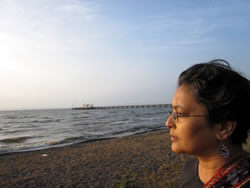
Dentro del río están
el cielo, la nube y el sol
En el cuenco de mis manos está el río
Si alzo mis manos,
El río se derrama en gotas, dispersando
cielo, nube y sol sobre mí toda.
Si del cuenco de mis manos bebo del río;
dentro de mí entonces
el sol, la nube y el cielo.
Dime, ¿quién está dentro de quién?
Traducción de Nelson Roque Valdez
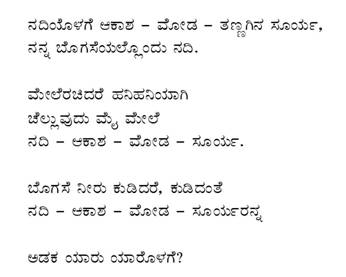
A RIVER POEM
Inside the river are
the sky, the cloud, and the cold sun.
In my hands’ bowl is the river.
If I throw up my hands,
the river spills in drops, scattering
sky, cloud, and sun all o’er me.
From my hands’ bowl, if I drink
the river, then within me,
the sun, the cloud, and the sky.
Tell me, who is in who?
Translated by Chitra Panikker with the poet
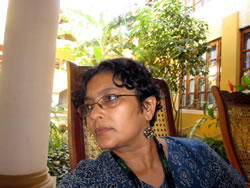
Como esto, en la página “la canción”…
como el diseño tatuado
es la canción
desde la página suena la palabra,
suenan las palabras una tras otra;
cadena de palabras-sonido
deja que flote en la brisa… ¡ahí está la palabra!
ahora
en la página
la canción es las palabras
silenciosa es la canción.
Traducción de Nicolás Suescún
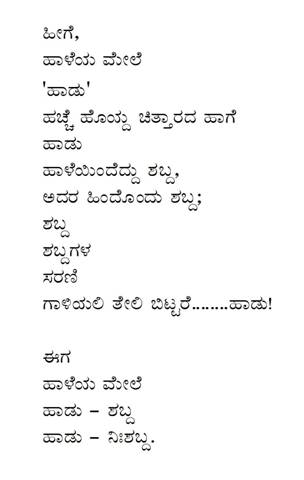
Like this, on the page “the song”
like the tattooed design
is the song
from the page the word sounds,
sound the words one behind the other;
chain of words-sound
let float in the breeze…..there the song!Now
on the page
the song is the words
silent is the song .
Translated by Chitra Panikker with the poet
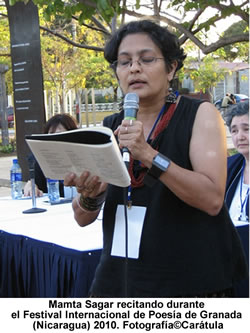
LAS PALABRAS
¿Por qué son así las palabras?
¡Negras gotas goteantes
forma dada al espacio blanco!
¿Por qué son así las palabras?
Visibles, pero mudas;
aquellas invisibles, se escuchan.
Traducción de Nicolás Suescún
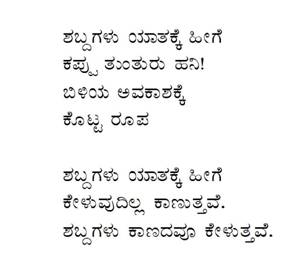
WORDS
Why are words like this?
Black drizzling drops
the form given to the white space!
Why are words like this?
Visible, but soundless;
Those invisible are also heard.
Translated by the poet
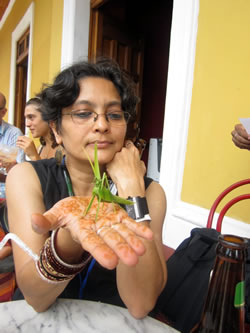
MI MADRE Y YO
Soy exactamente como mi madre
Cuerpo delgado, dedos huesudos,
Círculos oscuros debajo de los ojos;
Dentro, un corazón fuerte
cargado de atenciones; una mente
acosada con pensamientos que no puede
acarrear completamente; y a primera vista,
una suave sonrisa.
Soy exactamente como mi madre
Sus lágrimas fluyen en mis ojos.
Traducción de Nelson Roque Valdez
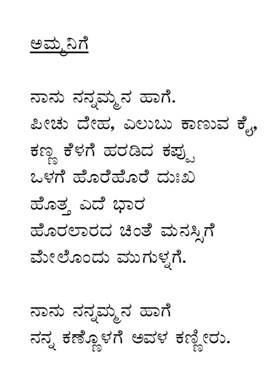
Mother and Me
I’m exactly like my mother
– thin body, bony fingers,
dark circles below the eyes;
within, a heavy heart
loaded with cares; a mind
beset with thoughts it can’t
quite carry; and on the surface,
a smooth smile.
I’m like my mother exactly;
her tears flow in my eyes.
Translated by Chitra Panikker with the poet
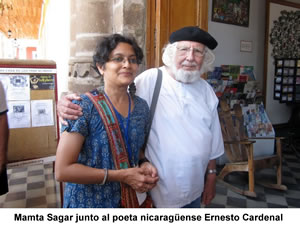
Claustrofobia
Un cuadrado —
la cocina, la sala, la alcoba
—un puro cuadrado.
El colchón, la cama, la sábana
—un perfecto cuadrado
El libro, la mesa, el asiento
…el flujo de conciencia
todo está dentro de
esta cuadrada barrera.
La puerta, el techo, la pared,
las losas blancas en el piso
finalmente,
el fragmento de cielo
que permite el ventilador
—todos tienen cuatro esquinas.
La redondez de la tierra es sospechosa
Si las palabras saltan afuera,
si cruzan la página, si
escapan de la barrera del significado,
entonces, variables límites
para las formas sin sonido.
Aquí, el sentido del espacio
se torna en su opuesto
—el espacio se extiende sin fin…
(tanto espacio se halla dentro del E S P A C I O)
Traducción de Nicolás Suescún
Clautrophobic
A Square –
the kitchen, the hall, the bed-room
–a neat square.
The mattress, the cot, the bed-sheet
–a perfect square.
The book, the table, the chair
…the thought-stream;
everything is within
this square-barrier.
The door, the roof, the wall,
white tiles laid on the floor,
finally,
the fragment of sky
the ventilator admits in
–have all corners four.
The roundness of the Earth stands suspect.
If the words jump out,
if they cross the page, if
they escape the meaning-barrier,
then, varying limits
for the soundless forms.
Here, sense of space
changes to its converse
–space spreads endlessly…
(so much of space
lies within S P A C E)
Translated by Chitra Panikker with the poet
EL RÍO FLUYE EN LA PÁGINA EN BLANCO
El río fluye sobre la página vacía
El agua está “clara”
se puede ver el fondo.
“Glu-glu” fluye el río,
las ondas “galopan”
la brisa sopla “fresca”.
El árbol en la orilla
—una sombra
para el río;
junto con el río
inmóvil fluye el árbol
con sus ramas, flores, hojas.
Si meto los pies en el río
se formarán ondas alrededor
Si nado en el río,
si me doy vuelta
e intento nadar de espaldas
entonces,
gradualmente,
desde las “aguas claras”
me hundiré hasta el fondo.
Estoy en el río que fluye
en la página en blanco.
Si el río se hunde en la sábana,
la canción del río
es tragada por la sábana;
la sábana todavía parece vacía,
como si nada hubiera pasado —
blanco, suave, liso, fresco, claro
como un monumento de mármol
construido en la memoria del río.
Traducción de Nicolás Suescún
THE RIVER FLOWS ON
The river flows on the empty page.
The water stands “clear”
one can see the bottom.
“Julu-julu” flows the river,
the waves “gallop”,
the breeze blows “cool”.
The tree on the bank
–a shade
for the river;
along with the river
standstill flows the tree
with its branches, flowers, leaves.
If I put my feet in the river,
there’ll be ripples all around them;
If I swim in the river,
fall back on myself,
attempt a back- stroke
then,
gradually,
from the “clear waters”,
I’ll sink to the bottom.
I’m in the river that flows
on the empty sheet.
If the river sinks into the sheet,
the song of the river
gets swallowed by the sheet;
the sheet still looks empty,
as if nothing happened –
white, smooth, plain, cool, clear
like a marble monument
built in memory of the river.
Translated by Chitra Panikker with the poet
LA ESPERA
¿Para qué esperamos del todo,
así como así,–
la mirada clavada
en el camino por el que
después de venir
parece como que no ha venido?
Como el fuego de su corazón
tocado por su lengua,
de reojo lanzó chispas
hasta el chisporroteo
el estallido de ira, y se va… por qué esperar?
¿por qué cubrirme el palpitante corazón
con la palma de la mano?
“¿No está contigo en tu casa?
Está bien… si viene… te cuento”
—su voz al otro lado de la línea
¿cómo puede saber
que es posible
que no venga nunca?
Debajo de un gran camión de carga
“¡Ah, no, no!” ¡Para decir sólo esto
es que esperamos?
¿Esperamos el dolor, la Muerte?
Ahora, en cualquier momento
terminará la espera,
se acabará por fin,
ya casi se acaba.
Que llegue alguien
toque en mi puerta
con la noticia —
¿Qué esperamos,
por qué esperamos
a aquel que va a venir
o no vendrá nunca?
Finalmente, por la puerta abierta,
como si la oscuridad misma hubiera irrumpido,
llega él, como si no hubiera venido del todo.
¡Entonces la espera
será para otro día, por otra noche!
Traducción de Nicolás Suescún
THE WAIT
Why do we wait at all,
just like that,
our eyes on the path
for him who
even after he comes, looks
like he hasn’t come at all?
As the fire in his heart
played on the tongue,
the edge of his eye darted
sparks till
the crackle, the burst,
the leaving . . . why wait?
why enfold the beating heart
in the palm?
“Is he not there, at your place?
Ok, fine. . . He might come . . . Anyway,
if he comes, I’ll let you know”
– the voice at the other end,
how may it know
that he may not
come at all?
Under some lorry,
or under a truck –
‘Oh, No, No!’ Just to say this,
is it, that we wait?
Are we waiting for pain, for Death?
Now, any time,
this wait will be over
it will be over
it’s almost over.
Let anyone come
knock on the door
give me the news –
What do we wait for,
why wait at all,
for him to come or
not to come?
Finally, from the open door,
as if darkness itself has barged in,
he comes, as if he hasn’t come at all.
Now, the wait
is for another day, another night!
Translated by Chitra Panikker with the poet
A LAS ESCONDIDAS
una hoja de un árbol
flotando
deslizándose
meciéndose
como un cometa acariciando el viento
ahora un bote en el río
llevando peces multicolores
en las brillantes aguas doradas
nadando con prisa
desapareciendo en la corriente
el agua no sabe
el viento no sabe
el árbol no sabe
los peces no saben
jugar a las escondidas.
Traducción de Nicolás Suescún
HIDE AND SEEK
a leaf from the tree
gliding
sliding
swinging
like a kite caressing the wind
now a boat on the river
along with colourful fish
a green flash on the
shining golden water
moved hurriedly
disappeared with the flow
water doesn’t know
air doesn’t know
tree doesn’t know
fish don’t know
this game of hide and seek.
Translated from Kannada by O. L. Nagabhushana Swamy
NUEVAMENTE LLUEVE
Yo y él
mojándonos en la distancia de nuestros cuerpos soldados
Y yo recordando
Los bosques densos y oscuros de su patria.
Grandes árboles,
Nidos de amor en cada rama
“llueve así también allá”
susurra él en mis oídos
sus negros y rizados mechones
juegan sobre mi frente
y susurro
“llueve así aquí también”
Un relámpago irradia en los ojos
Y el deseo llueve
Mi aliento caliente
juguetea sobre él
Su sonrisa juguetea sobre mis labios
La lluvia espera afuera
Mientras esperamos mojarnos dentro
Él la lluvia dentro de mí
Yo la lluvia dentro de él
Y sin
aquí
ahora
Sus recuerdos se derraman como lluvia
Como un sueño olvidado retornando
fragancia de su amor
Y allá gotas
Mi recuerdo en su corazón
La lluvia cae
Aquí y allá.
Traducción de Nelson Roque Valdez
RAIN AGAIN
me and him
getting wet
in the distance between our welded bodies
and me remembering
the dark dense woods of his country
trees as tall as a person
nests of love in each bough
‘it rains like this there too’
he whispers
his black curly locks
play over my forehead
and i whisper
‘it rains like that here too’
lightning oozes in the eyes
and desire rains
my hot breath
plays over him
his smile
plays over my lips
rain waits outside
as we wait getting wet within
he the rain within me
me the rain within him
and without
here
now
his memories pour as rain
like a forgotten dream returning
fragrance of his love
and there drops
my memory
in his heart
rain pours
here and there
Translated by O.L.Nagabhushana Swamy
“UN CUENTO DE HABÍA UNA VEZ”
El pequeño viene corriendo,
me abraza
y empieza a rogar:
“Amma, cuéntame un cuento
… un cuento de tu tierra,
una historia de bosques, lluvias, ríos”.
“Escucha…
todo fue cierta vez
cierta vez en una tierra —
mi tierra, ‘Dharanimandala’,
justo en el centro de la tierra,
donde la leche y azúcar morena
se hierven para hacer ginna
donde al lamer
el dulce en la palma de la mano,
la vaca asustada en el establo
dice Muuuh…”
Afuera, cae la lluvia
incesante; también hubo rayos
—ahí, en los ojos del niño.
Entre la historia y la memoria
no hay mucha diferencia: el cuento
puede no ser muy cierto, la memoria
puede no ser muy fiel.
“Esta tierra, tierra de mujer
no es esta tierra o esa tierra”
“¿Qué quiere esto decir?”
“No se debe descartar como eso o aquello…
Ella te recogerá y te abrazará
muy fuerte, te consentirá;
te dará frutas, y cosas como frutas
que te sacien; de ella
brotará fuerte el agua
sin fin, como un elíxir, llenando
hoyos, cerros, ríos.
En sus ríos brillan peces plateados
como diamantes, como joyas;
su mezcla roja y amarilla con
azul —los peces en ruidoso juego”.
Los ojos del niño están llenos de sueño
—¿está soñando?
Entre el cuento y el sueño
no hay mucha diferencia —
ambos se basan en mentiras.
“A alguien como ella
era lo que esperaban ellos.
Sus colinas y bosques
talados, destruidos;
entonces la tatuaron con brea
y así la engalanaron.
El sol que besó
su frente de colinas
es ahora una historia…
el sol calienta ardiente ahora
golpea el vértice, raja la cabeza.
La fragancia de sus verdes
la frescura de su brisa
la frescura de sus ríos
—todo eso es un recuerdo”.
El pequeño dormido se
da vuelta sin escucharme
el cuento del recuerdo de la tierra.
Traducción de Nicolás Suescún
“A Once-Upon-A-Time Story”
The little one comes running,
throws his arms around the neck,
and starts pleading:
“Amma, tell me a story
… the story of your land,
the story of forests, rains, rivers.”
“Listen…
it’s all once upon a time
once upon a land –
my land, “Dharanimandala,”
right at the Earth’s centre,
where milk and jaggery
are boiled to ‘ginna’
where, when the sweet
poured on the palm is licked,
the scared cow in the stable
cries Mmbaa…”
Outside, incessantly poured
the rains; there was lightning too
– there, in the child’s eyes.
Between the story and the memory,
there isn’t much difference; the story
may be a little untrue, the memory
if it may become untrue.
“This land, a she-land
is not this-land or that –land”
“Means?”
“She’s not to be dismissed as this or that…
She’ll scoop you up in an embrace,
hold you close to her, cuddle you;
she’ll feed you with fruits, the likes
of fruit, satiate you; there,
the water will spring forth
endlessly, elixire-like, filling up
hole, ridges, streams.
In her rivers sparkle golden fish
like diamonds, prescious stones;
their red and yellow mix with
the blue – the fish in boisterous play.”
The child’s eyes are full of sleep
– is he dreaming?
Between the story and the dream
there isn’t much difference –
both are rooted in lies.
“Someone like her
was what they waited for.
Her hills and forests
axed, undone;
then did a tattoo of tar
on her and decked her up.
The sun that kissed
her hilly forehead
is now a story ….
the sun’s burning heat now
hits the vortex, slits the head.
The fragrance of her greens
the coolness of her breeze
the freshness of her rivers
– all that is now a memory.”
The little one turns over
in his sleep without listening
to the land’s memory-tale.
Mamta Sagar nació en la India en 1966. Poeta y dramaturga. Tiene tres colecciones de poemas: Como esta canción, 2007; Huellas del pavo real salvaje, 1992 y La humedad del río, 1999 y cuatro piezas de teatro. Su obra La oscilación del deseo, está incluida en la antología, Staging Resistance: Plays by Women in Translation (Organizando una resistencia: Obras por mujeres traducidas), 2004. Temas de mujeres, una colección de ensayos escritos en kannada e inglés acerca del género, el lenguaje, la literatura y la cultura, 2007, es su más reciente libro. Representó a la India en el noveno Festival de Poesía del África que se celebró en octubre de 2005 en Durban, Sudáfrica. Traduce poesía africana y francófona contemporánea al Kannada. Ha dirigido talleres de teatro y poesía terminando con lecturas y producciones para mujeres, niños y personas de las comunidades marginadas. Sus poemas han sido traducidos a idiomas de la India tales como Marathi, Hindi, Malayalam, Bengali, Telugu, como al inglés, español y francés; su obra se ha publicado en varios periódicos y antologías de poesía en los idiomas mencionados anteriormente. El trabajo que está realizando en su doctorado en la Universidad de Hyderabad es sobre literatura comparativa y su tesis se titula Género, patriarcado y resistencia: Poesía femenina contemporánea en kannada e Hindi, 1980-2000. Actualmente enseña en el Centro para estudios Kannada, en la Universidad de Bangalore y vive en Bangalore, India; [email protected]
Mamta Sagar has three collections of poems, four plays and a collection of essays on Gender, Language, Literature and Culture for her credit. She has conducted theatre and poetry workshops culminating with readings and productions for women, children and people from marginalized communities. Her poems are translated into many Indian languages including English, apart from Vietnamese, Cebuana, Spanish and French and have seen publication in various journals and poetry anthologies in those respective languages. As a poet, Mamta has participated in Poetry Africa, Medellin, Cuba, Vietnam and Granada poetry festivals. With a specialization in Comparative Literature, Gender Studies, Kannada Literature and Cultural Discourse, she teaches at the Centre for Kannada Studies, Jnana Bharathi, Bangalore University and lives in Bangalore, India; [email protected]
